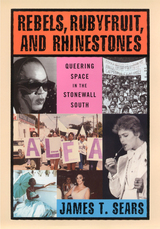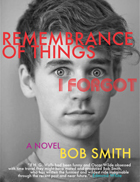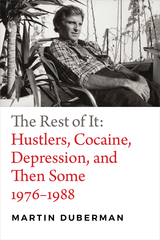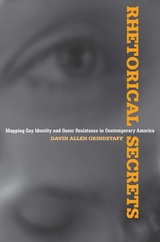117 books about Gay men and 4
start with R
117 books about Gay men and 4
117 books about Gay men
4 start with R start with R
4 start with R start with R

Rebels, Rubyfruit, and Rhinestones
Queering Space in the Stonewall South
Sears, James T.
Rutgers University Press, 2001
While Scarlett O'Hara may resemble a drag queen, and Mardi Gras inspires more camp than a gay pride parade, the American South also boasts a rich, authentic and transgressive gay and lesbian history. In this chatty, free-ranging cultural survey, Sears (Growing Up Gay in the South) presents a vivid kaleidoscope of the mores and political activities of many gay Southerners following the 1969 Stonewall riots and leading up to the 1979 march on Washington. Sears unspools this history through portraits of activists and community organizers including Merril Mushroom, Jack Nichols, Lige Clark, Vicki Gabriner, Minnie Bruce Pratt and Sgt. Leonard Matlovitch who helped shape the social and political climate below the Mason Dixon line and often in the rest of the country. While giving a nod to historic events like Anita Bryant's Save Our Children campaign, Sears focuses more closely on obscure but important local political events, like the founding of the lesbian journal Sinister Wisdom, the emergence of the Atlanta Lesbian Feminist Alliance and community response to a deadly firebombing that killed 31 patrons in a New Orleans bar in the mid-1970s. Sears's multifaceted approach pays off when he sketches such relatively unknown players as comedian Ray Bourbon and radical fairy Faygele ben Miriam, and he conveys well the complexity and intensity of the political activity of the decade. While not as historically conclusive or theoretically astute as John Howard's masterful Men Like That (2000), Sears provides a panoply of emotionally riveting snapshots that aptly portray Southern gay experience in the 1970s. B&w photos.
[more]

Remembrance of Things I Forgot
A Novel
Bob Smith
University of Wisconsin Press, 2011
“It’s safe to say your relationship is in trouble if the only way you can imagine solving your problems is by borrowing a time machine.”
In 2006 comic book dealer John Sherkston has decided to break up with his physicist boyfriend, Taylor Esgard, on the very day Taylor announces he’s finally perfected a time machine for the U.S government. John travels back to 1986, where he encounters “Junior,” his younger, more innocent self. When Junior starts to flirt, John wonders how to reveal his identity: “I’m you, only with less hair and problems you can’t imagine.” He also meets up with the younger Taylor, and this unlikely trio teams up to plot a course around their future relationship troubles, prevent John’s sister from making a tragic decision, and stop George W. Bush from becoming president.
In this wickedly comic, cross-country, time-bending journey, John confronts his own—and the nation’s—blunders, learning that a second chance at changing things for the better also brings new opportunities to screw them up. Through edgy humor, time travel, and droll one-liners, Bob Smith examines family dysfunction, suicide, New York City, and recent American history while effortlessly blending domestic comedy with science fiction. Part acidic political satire, part wild comedy, and part poignant social scrutiny, Remembrance of Things I Forgot is an uproarious adventure filled with sharp observations about our recent past.
InSight Out Book Club, featured selection
Bob Smith named one of Instinct magazine’s Leading Men 2011
Winner, Barbara Gittings Literature Award/Stonewall Book Awards, American Library Association
Finalist, Over the Rainbow Selection, American Library Association
Finalist, Green Carnation Prize, international prize for LGBT Literature
Amazon Top Ten Gay & Lesbian Books of 2011
Best Books for General Audiences, selected by the American Association of School Librarians
Best Books for General Audiences, selected by the Public Library Reviewers
[more]

The Rest of It
Hustlers, Cocaine, Depression, and Then Some, 1976–1988
Martin Duberman
Duke University Press, 2018
For many, the death of a parent marks a low point in their personal lives. For Martin Duberman—a major historian and a founding figure in the history of gay and lesbian studies—the death of his mother was just the beginning of what became a twelve-year period filled with despair, drug addiction, and debauchery. From his cocaine use, massive heart attack, and immersion into New York's gay hustler scene to experiencing near-suicidal depression and attending rehab, The Rest of It is the previously untold and revealing story of how Duberman managed to survive his turbulent personal life while still playing leading roles in the gay community and the academy.
Despite the hardships, Duberman managed to be incredibly productive: he wrote his biography of Paul Robeson, rededicated himself to teaching, wrote plays, and coedited the prize-winning Hidden from History. His exploration of new paths of scholarship culminated in his founding of the Center for Lesbian and Gay Studies, thereby inaugurating a new academic discipline. At the outset of the HIV/AIDS epidemic Duberman increased his political activism, and in these pages he also describes the tensions between the New Left and gay organizers, as well as the profound homophobia that created the conditions for queer radical activism. Filled with gossip, featuring cameo appearances by luminaries such as Gore Vidal, Norman Mailer, Vivian Gornick, Susan Brownmiller, Kate Millett, and Néstor Almendros, among many others, and most importantly, written with an unflinching and fearless honesty, The Rest of It provides scathing insights into a troubling decade of both personal and political history. It is a stimulating look into a key period of Duberman's life, which until now had been too painful to share.
Despite the hardships, Duberman managed to be incredibly productive: he wrote his biography of Paul Robeson, rededicated himself to teaching, wrote plays, and coedited the prize-winning Hidden from History. His exploration of new paths of scholarship culminated in his founding of the Center for Lesbian and Gay Studies, thereby inaugurating a new academic discipline. At the outset of the HIV/AIDS epidemic Duberman increased his political activism, and in these pages he also describes the tensions between the New Left and gay organizers, as well as the profound homophobia that created the conditions for queer radical activism. Filled with gossip, featuring cameo appearances by luminaries such as Gore Vidal, Norman Mailer, Vivian Gornick, Susan Brownmiller, Kate Millett, and Néstor Almendros, among many others, and most importantly, written with an unflinching and fearless honesty, The Rest of It provides scathing insights into a troubling decade of both personal and political history. It is a stimulating look into a key period of Duberman's life, which until now had been too painful to share.
[more]

Rhetorical Secrets
Mapping Gay Identity and Queer Resistance in Contemporary America
Davin Allen Grindstaff
University of Alabama Press, 2006
Davin Allen Grindstaff, through a series of close textual analyses examining public discourse, uncovers the rhetorical modes of persuasion surrounding the construction of gay male sexual identity. In Part One, Grindstaff establishes his notion of the "rhetorical secret" central to constructions of gay male identity: the practice of sexual identity as a secret, its promise of a coherent sexual self, and the perpetuation of secrecy as a product and strategy of heteronormative discourse.
Grindstaff continues in Part Two to examine major issues related to contemporary conceptions of gay male identity: overturning sodomy laws; public debates over same-sex marriages; medical and social responses to the HIV/AIDS crisis; the rhetorical power of hyper-masculine body images and homoeroticism to creative communities; and, finally, what Grindstaff considers to be the most mysterious and significant rhetorical practice of all: coming out of the closet.
By investigating the public discourse--texts and images that circulate, produce knowledge, and become means of persuasion--surrounding the constructions of sexual identity, Grindstaff challenges heteronormative concepts of sexuality itself, thus creating new maps of social power and new paths of resistance.
[more]
READERS
Browse our collection.
PUBLISHERS
See BiblioVault's publisher services.
STUDENT SERVICES
Files for college accessibility offices.
UChicago Accessibility Resources
home | accessibility | search | about | contact us
BiblioVault ® 2001 - 2024
The University of Chicago Press









